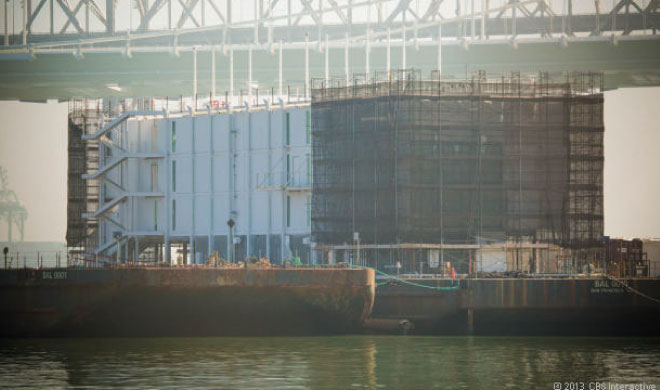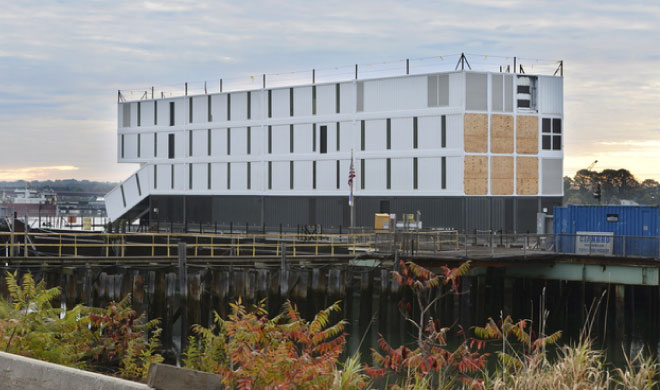Mysterious Google-owned, barge-borne structures made of slotted-together cargo containers have recently appeared on both coasts, and speculation as to the structures' purpose is running wild.
The mystery San Francisco barge | Source: CNET
Two structures of similar design have thus far been photographed, one moored at San Francisco's Treasure Island and the other at a wharf in Portland, Maine. A third is rumored to be under construction in Connecticut, but photos of the southern New England erection have yet to surface.
Each edifice looks to be constructed from 48 standard-sized shipping containers arranged in a three "decks," each featuring sixteen containers laid out in a four by four grid. The decks sit atop a slightly shorter and narrower base that appears to also be made of containers, and a portion of a container at one end of the lowest deck is angled down to form a "ramp," which presumably acts as the entrance to the facility.
Portland's Press Herald was the first to report on the structures and initiated speculation on a possible link to Google. The paper spoke to the CEO of Cianbro, a marine outfitting company working on the Maine-docked barge, who said the firm is "absolutely forbidden to discuss it in any way or in any detail," but indicated that the project will be of great benefit to the state.
CNET published a much more in-depth report last week and found evidence that the San Francisco version is indeed owned by the search giant and suggests it is being prepared as a floating datacenter. Google is the owner of a 2009 patent for floating data centers which would anchor up to seven miles off shore, using wave energy generators for power and taking advantage of cool ocean water for temperature regulation.
"The cutouts in the long walls of the containers, when they line up, they make hallways," Joel Egan, head of cargo container building design firm Cargotecture, told CNET. "You could put all sorts of mainframes into the containers."
San Francisco CBS affiliate KPIX followed up with an investigation of its own, reporting that sources told the station the barges are not destined to become datacenters, but rather floating marketing hubs for Mountain View's Google Glass augmented reality headgear.
KPIX says Google's ultimate goal would be to park the barge at San Francisco's Fort Mason, but that work has stalled because the company is having difficulty obtaining the necessary permits.
Taking into consideration Google's patent, the simultaneous construction of at least two of the structures — Â one on each coast of the United States — Â and Google's history of going to great lengths to increase the reliability, speed, and power efficiency of its datacenter network, it would seem that the datacenter explanation is the more plausible of the two.
 Shane Cole
Shane Cole








-m.jpg)






 Charles Martin
Charles Martin
 Christine McKee
Christine McKee
 Wesley Hilliard
Wesley Hilliard
 Malcolm Owen
Malcolm Owen
 Andrew Orr
Andrew Orr
 William Gallagher
William Gallagher
 Sponsored Content
Sponsored Content








61 Comments
No property taxes for their off shore data centers.
Heck yes, time for the ship jokes.
“Isn’t it funny, a ship that leaks from the top…”
Lets see%u2026%u2026 would a giant water heater running 24/7 have any environmental impact on the the surrounding water temperature and marine life...
What about storms and hurricanes%u2026I hope they have researched this enough...
They should call it the Sea Drive.